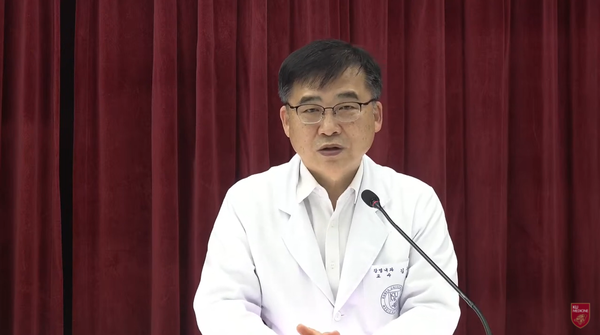Despite the skyrocketing number of Covid-19 cases surpassing 600,000 daily and increasing deaths, the government played down the danger of Omicron infection as if it were similar to seasonal flu, an expert said.
On a YouTube broadcast Thursday, Professor Kim Woo-joo of infectious disease at Korea University Guro Hospital, the health authorities’ easing of quarantine measures was “dangerous.”

According to the Central Disease Control Headquarters, Korea had 621,328 new Covid-19 daily cases, and the total number of Covid-19 cases reached 8.25 million as of Wednesday midnight.
Daily deaths caused by the pandemic also hit a record high. The total deaths recorded 11,481, and 51.5 percent of them occurred this year.
However, the government said the fatality of the Omicron variant was similar to that of seasonal influenza and that the nation had a lower Covid-19 fatality rate than other countries. The authorities have maintained the stance to ease viral curbs so far.
The government is reportedly mulling relaxing rules to allow a private gathering of eight people and business operations until midnight. The current rules limit the number of private gatherings to six and business operations until 11 p.m.
The authorities started discussing whether to exclude Covid-19 from Group 1 infectious diseases list. A Group 1 infectious disease has a high fatality rate and a high risk of cluster infections requiring immediate disease control measures such as negative-pressure isolation.
However, Covid-19 has become so widespread that even clinics see Covid-19 patients, and it may not make sense to classify Covid-19 as Group 1 infectious disease, the government said.
Kim criticized the government for considering excluding Covid-19 from Group 1 infectious diseases.
“The government says its fatality is similar to seasonal flu, but such remarks led the public not to be cautious about Covid-19,” he said.
“Global data showed that Korea had the highest number of new infections per 1 million population. Korea once boasted its response to Covid-19 and promoted it as ‘K-quarantine,’ but it failed miserably.”
While hospitals were struggling with an extreme shortage of beds for seriously ill Covid-19 patients, the government kept saying they had vacant beds, Kim went on to say.
According to Kim, the government said no patient was waiting to be hospitalized, but 148 people died due to cluster infections at nursing hospitals and nursing homes.
This meant that infection control failed at nursing homes, and Covid-19 patients were not getting transferred to the right hospitals to receive timely treatment.
“Unlike the government’s claim that only 65.6 percent of intensive care units (ICU) were in operation, ICUs are already in full operation,” he added. “We’re seeing a repeated irony that so many deaths, over 400 daily, led to a decline in the number of critically ill patients and emptied ICUs.”
Kim noted that he has repeatedly persuaded the government to separate the routes between Covid-19 patients and general patients since the early outbreak of Covid-19 in 2020. Still, the government did not listen to him.
“The government is relaxing social distancing when Covid-19 cases are surging. No medical system will be able to deal with the current situation, and the nation will suffer more difficulties,” he said.
Clinics see Covid-19 patients, but most of their work is focused on rapid antigen testing, Kim said.
“Every neighbor has to have a primary medical institution that provides all cycles of Covid-19 treatment from examination to treatment,” he said.

